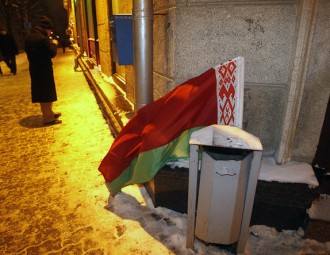Yury Chavusau: Anti-extremist amendments to legislation chiefly aim at the threats of a hybrid war
 nn.by
nn.by
However, the Belarusian secret services are acting just as always – they react to the aggravation of the threats with increased control and increasing their repressive capacities.
On April 4 all of a sudden the House of Representatives passed a law in the second reading, which introduces liability for extremism and for the use and production of the so-called "Molotov cocktails” into the Criminal Code.
The responsibility "for the creation of an extremist unit, for guiding it or its structural subdivision" is the custodial restraint of up to 5 years, or imprisonment from 3 up to 7 years. For repeated violation of this article harsher punishment is provided: the restriction of freedom for a period of 3-5 years, or imprisonment for a term of 6-10 years.
Criminal liability is also presupposed for funding extremist groups: conviction for up to 5 years, or imprisonment for the term from 3 to 6 years.
The draft law also provides for the establishment of criminal and administrative responsibility for "Molotov cocktails". Offenders under this article will be fined or assigned correctional labor (or imprisonment) for up to 2 years.
What do the unexpected innovations hide? The political scientist Yury Chavusau answers the questions of the "EuroBelarus" Information Service.
- The amendments to the legislation come as a package – similar packages of laws in Belarus have always been timed either to the election campaigns, or after them. Now there are no election campaigns and no election tension, but security forces are, apparently, trying to prove to the political leadership of the country that they are useful and able to react to new challenges.
Changes to the legislation chiefly aim at the threats of a hybrid war, which got actualized in connection with the Russia-Ukraine conflict. Certainly, Belarusian secret services are acting just as always – they react to the aggravation of the threats with increased control and their repressive capacities.
I am personally worried about the new opportunities to qualify the dissemination and preservation of extremist materials as law violations before the court finds them extremist. Previously printed, audio-, and video materials were seized so that later the Court could decide whether they are extremist or not. Now we face the danger that responsibility under this article will be extended.
The changes aimed against Belarusan citizens who are fighting in the eastern Ukraine are obvious, too; it wasn’t opportune to use the term “mercenariness" against them, so the authorities adjust the criminal law to their political needs.
These changes are alarming: there is no certainty that the security services will use new opportunities for the Belarus’ benefit, not to strengthen the political pressure. The new law puts the Belarusians that protect Ukraine from the separatists under the threat of criminal prosecution; they will be afraid to return to Belarus.
- Will the draft law affect the work of the opposition and human rights defenders?
- I think that the standards re extremist materials may affect the ability to transport human rights literature and political materials across the border. But the Belarusian civil society and the Belarusian opposition live under severe restrictions anyway; and although, in my opinion, the new rules won’t directly affect the Belarus opposition and human rights defenders, they will get them to be more vigilant.
- Can a new law result in strengthening of self-censorship in the independent Belarusian media?
- The degree of self-censorship in the Belarusian independent media is quite high as it is. It is not the introduced amendments, but the law enforcement practice that will increase the taken precautions. When the wide application of the new law starts, the media will also be forced to pay more attention to their publications.
But I don’t think that the online registered or print media are the target of a new package of legislative amendments. My forecast is that in the first place, these regulations will affect the spreading of information through the Internet – not only via media, but also via social networks.
- The draft law has been adopted just in the midst of an economic crisis. Could the government use it against the socio-economic demonstrations in the country, which we cannot exclude?
- I don’t see the direct connection here. The thing is that the Belarusian authorities use a different tactics for the socially motivated protests: they aim at isolating the leaders of the social protests, and try to appease the broad masses of protests somehow. I don’t think that this draft law is directly connected with the economic tension.
-
03.01
-
07.10
-
22.09
-
17.08
-
12.08
-
30.09



























